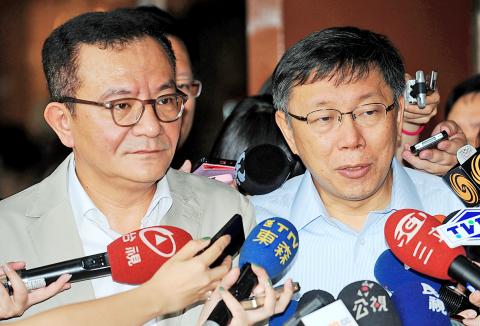The Democratic Progressive Party (DPP) yesterday made an unofficial commitment to independent Taipei mayoral hopeful Ko Wen-je (柯文哲) that it would not nominate its own candidate in the election and reached an agreement with the Taiwan Solidarity Union (TSU) that only one candidate would represent the pan-green camp in the New Taipei City mayoral election.
DPP Legislator Gao Jyh-peng (高志鵬), who served as convener of a task force for the DPP’s Taipei mayoral primary, issued a joint statement after a two-hour meeting with Ko that the DPP agreed to cooperate with the independent candidate to end the decade-long governance of the Chinese Nationalist Party (KMT) in Taipei.
The DPP pledged that it would not ask Ko to join the party should he win the election and that the party would not interfere with Ko’s personnel decisions, Gao said, adding that the 27 DPP candidates in the Taipei councilor elections would support Ko’s campaign.

Photo: Chang Chia-ming, Taipei Times
The meeting, which gathered the National Taiwan University Hospital physician and several DPP officials, including Gao and deputy secretary-general Hung Yao-fu (洪耀福), was held after Ko beat DPP Legislator Pasuya Yao (姚文智) in an opinion poll conducted by the DPP on Friday that aimed to finalize the sole pan-green camp candidate and boost the chances of defeating KMT nominee Sean Lien (連勝文).
The DPP’s decision not to nominate its own candidate in the Taipei mayoral election will not be official until the Central Executive Committee meets tomorrow, but the joint statement has erased any possibility that the party would renege on its promise to work with Ko, which at one point was creating confusion after the announcement of the poll result on Friday.
As part of the reciprocal commitment, Ko agreed to hold talks with DPP candidates in other mayoral and commissioner elections to formulate “shared platforms” and, if he wins the election, take the same positions as DPP mayors and commissioners on major policy discussions.
Ko also pledged to campaign for DPP candidates in the Taipei councilor elections.
Meanwhile, the DPP, led by former party secretary-general Su Jia-chyuan (蘇嘉全), convener of a special committee in charge of seven-in-one elections affairs, held talks with the TSU yesterday and both sides agreed to hold a public opinion survey by the end of this month to determine the final pan-green camp New Taipei City mayoral candidate in a similar format to the Taipei mayoral primary.
Former premier Yu Shyi-kun (游錫堃), the DPP’s candidate for the New Taipei City mayoral election, will compete with TSU Secretary-General Lin Chih-chia (林志嘉) in the primary poll.
The pan-green camp candidate’s rival in New Taipei City remains unclear as New Taipei City Mayor Eric Chu (朱立倫) has yet to announce whether he will seek re-election.
If Chu decides to run for the presidency in 2016, the most likely replacement candidate would be New Taipei City Deputy Mayor Hou You-yi (侯友宜).

Intelligence agents have recorded 510,000 instances of “controversial information” being spread online by the Chinese Communist Party (CCP) so far this year, the National Security Bureau (NSB) said in a report yesterday, as it warned of artificial intelligence (AI) being employed to generate destabilizing misinformation. The bureau submitted a written report to the Legislative Yuan in preparation for National Security Bureau Director-General Tsai Ming-yen’s (蔡明彥) appearance before the Foreign Affairs and National Defense Committee today. The CCP has been using cognitive warfare to divide Taiwanese society by commenting on controversial issues such as Taiwan Semiconductor Manufacturing Co’s (TSMC, 台積電) investments in the

INVESTIGATION: The case is the latest instance of a DPP figure being implicated in an espionage network accused of allegedly leaking information to Chinese intelligence Democratic Progressive Party (DPP) member Ho Jen-chieh (何仁傑) was detained and held incommunicado yesterday on suspicion of spying for China during his tenure as assistant to then-minister of foreign affairs Joseph Wu (吳釗燮). The Taipei District Prosecutors’ Office said Ho was implicated during its investigation into alleged spying activities by former Presidential Office consultant Wu Shang-yu (吳尚雨). Prosecutors said there is reason to believe Ho breached the National Security Act (國家安全法) by leaking classified Ministry of Foreign Affairs information to Chinese intelligence. Following interrogation, prosecutors petitioned the Taipei District Court to detain Ho, citing concerns over potential collusion or tampering of evidence. The

‘COMPREHENSIVE PLAN’: Lin Chia-lung said that the government was ready to talk about a variety of issues, including investment in and purchases from the US The National Stabilization Fund (NSF) yesterday announced that it would step in to staunch stock market losses for the ninth time in the nation’s history. An NSF board meeting, originally scheduled for Monday next week, was moved to yesterday after stocks plummeted in the wake of US President Donald Trump’s announcement of 32 percent tariffs on Taiwan on Wednesday last week. Board members voted to support the stock market with the NT$500 billion (US$15.15 billion) fund, with injections of funds to begin as soon as today. The NSF in 2000 injected NT$120 billion to stabilize stocks, the most ever. The lowest amount it

NEGOTIATIONS: Taiwan has good relations with Washington and the outlook for the negotiations looks promising, Minister of Economic Affairs J.W. Kuo said Taiwan’s GDP growth this year is expected to decrease by 0.43 to 1.61 percentage points due to the effects of US tariffs, National Development Council (NDC) Minister Paul Liu (劉鏡清) said at a meeting of the legislature’s Economics Committee in Taipei yesterday, citing a preliminary estimate by a private research institution. Taiwan’s economy would be significantly affected by the 32 percent “reciprocal” tariffs slapped by the US, which took effect yesterday, Liu said, adding that GDP growth could fall below 3 percent and potentially even dip below 2 percent to 1.53 percent this year. The council has commissioned another institution